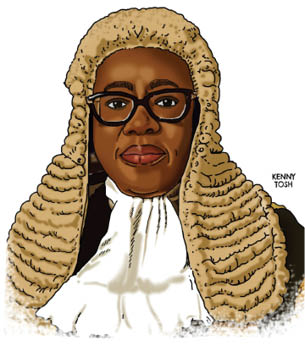Judgements: CJN Kekere-Ekun must act now
Controversial and conflicting judgements emanating from our courts are bringing the Judiciary to ridicule and creating a fertile environment for anarchy, as more and more Nigerians are losing confidence in our courts to deliver justice. From the granting of unnecessary ex-parte motions to judicial pronouncements that seem to contradict the provisions of the 1999 Constitution […]

justice kekere ekun
Controversial and conflicting judgements emanating from our courts are bringing the Judiciary to ridicule and creating a fertile environment for anarchy, as more and more Nigerians are losing confidence in our courts to deliver justice.
From the granting of unnecessary ex-parte motions to judicial pronouncements that seem to contradict the provisions of the 1999 Constitution of the Federal Republic of Nigeria, many judges have reduced themselves to guns for hire in the hands of moneybags and dubious politicians. They are seen as actors in gamesmanship and manipulations by forum shoppers, to undermine the judicial system and obtain unfair advantage even in cases that are unambiguous.
A recent case was an order of the Federal High Court in Abuja, in which Justice Joyce Abdulmalik stopped the Central Bank of Nigeria (CBN), the Accountant General of the Federation and some banks from disbursing Federal Account Allocation Committee (FAAC) payments to the Rivers State Government. The judge’s order may sound logical, as she said the Rivers State’s 2024 Appropriation Act was not properly passed into law. But the pronouncement is seen as another act in the messy political game, the hide-and-seek between two political forces in the oil-rich state. The judgment, if executed, will jeopardise the welfare and wellbeing of non-actors, like civil servants, pensioners, businessmen, and other Nigerians in Rivers State whose livelihood are linked to the distribution of resources from the state government’s treasury. This is why such a judgement could be too dangerous for the country’s democracy.
Of equal concern for the judiciary is the indiscriminate granting of ex-parte orders by judges without recourse to how such orders damage the polity or even the reputation of our courts. By its nature, an ex-parte order, which is usually given without fair hearing from the defendant, is granted in emergencies, where the life or property or interest of the person seeking the order is at risk. Though Nigerian judges now grant such orders in clear cases of political power struggle, in many societies, ex-parte orders are granted in matters involving domestic violence, stalking or harassment, custody of children for safety from harm, emergency asset freeze from being plundered, and civil suits of this nature.
- Inside military ‘battles’ against terrorists, oil thieves
- A glimpse of India’s 8th wonder of the world
In many countries, ex-parte orders are granted in very extreme cases as they contradict the fundamental right to due process, as enshrined in the Constitution. Judges, most times, throw out requests for ex-parte orders when seen to be frivolous, after reviewing the application, supporting documents, and after asking the plaintiff critical questions.
From the way ex-parte orders are approved by our judges, it is apparent that no critical appraisal of requests is done. During the tussle over the emirship of Kano, six contradictory ex-parte orders were granted by various courts in a short space of time. In the case involving the allegation of corruption against former Kogi State governor, Yahaya Bello, conflicting ex-parte orders and judgements were issued by judges in the Federal Capital Territory (FCT) and in Kogi State. On the Rivers State political crisis, judges appear to have turned themselves into pawns in the political game, as multiple ex-parte orders and judgements emanate from them, as if there are no rule books or laws guiding judicial pronouncements by our judges.
The Chairman of the Independent National Electoral Commission (INEC), Professor Mahmood Yakubu, in January 2018, expressed frustration over such frivolous ex-parte orders and judgements. At a meeting with the then Chief Justice of Nigeria, Justice Walter Onnoghen, the INEC chairman lamented thus: “In a recent leadership crisis in one political party, the Commission was served with six conflicting judgements and orders from courts of coordinate jurisdiction within a short period of three months. Similarly, the Commission was confronted by conflicting pronouncements by the lower courts on matters already decided by the superior courts, including the Supreme Court. This is making the work of the Commission very difficult and creating unnecessary negative public perception for INEC and, I must say, the Judiciary as well.”
From comments like this, our judges ought to realise that they confuse the people with deliberate misuse of their judicial powers through conflicting judgements and granting of frivolous ex-parte orders.
If the country’s Judiciary had hitherto been so subservient to powerful politicians, it would never have produced great luminaries who were sought after in different parts of the world. Justice Teslim Olawale Elias became the President of the International Court of Justice (ICJ) from 1982 to 1985. Justice Charles Onyema was made a replacement for an Australian judge at the ICJ in 1966. Justice Bola Ajibola was not only a judge of the ICJ, he was one of five members of the Eritrea-Ethiopia Boundary Commission. Justice Adetokumbo Adegboyega Ademola, the CJN from 1958 to 1972 was very famous locally and internationally. So was Justice Atanda Fatai Williams, a CJN from 1979 to 1983.
The Chief Justice of Nigeria, Justice Kudirat Kekere-Ekun, must wake up to this challenge; it is definitely not too early for her and the National Judicial Council (NJC) to take decisive action on this. Not only Nigerians, but also the international community is taking note of how our judges are trying to turn the Judiciary into a laughing stock.
We recall her words during her swearing in August as CJN. “We will take the judiciary to higher heights. The reputation that it has, we will improve it. We will make sure that people have more confidence in the Judiciary.”
Nigerians are anxiously waiting to see changes.
